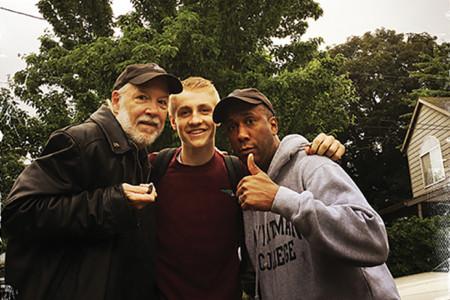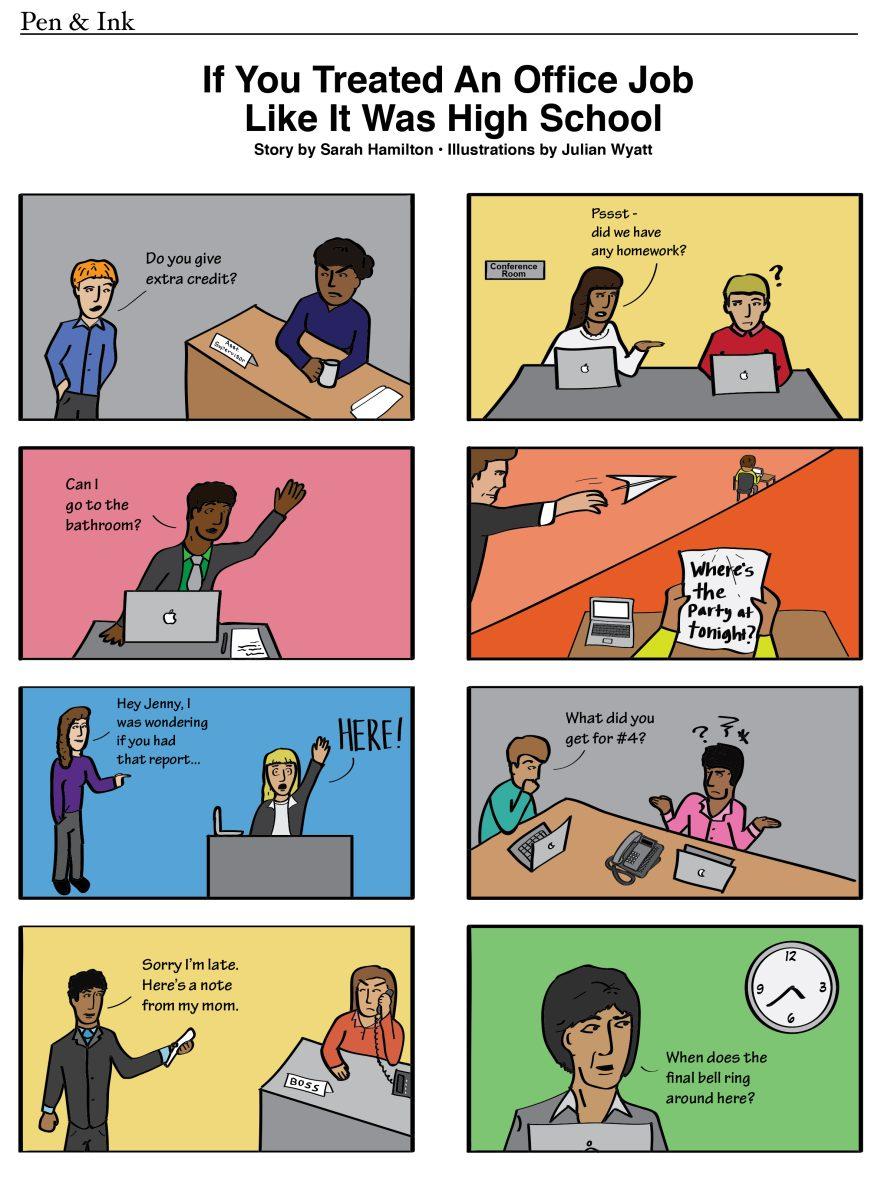
It’s lunchtime on a recent Wednesday, and the door to room 124 is ajar. Inside, members of Grant High School’s Black Student Union are hard at work planning the annual Black History Month assembly. They sit around a table, their conversation turning into a clamor.
In the thick of it is senior Khiarica Rasheed, talking to her friends about a poem she’s thinking of performing for the assembly. Her voice carries through the room, confident and clear.
The first thing most people notice about Rasheed, 17, is that she’s loud. Whether it’s leading “turn-up time” for school-wide pep assemblies or directing the girls varsity basketball team on the court, Rasheed’s energy is contagious. “She’s such a spark plug on the floor,” says Nina Radford, Rasheed’s close friend and teammate.
As a young African-American woman, Rasheed uses her voice to bring issues of race out of the shadows. Her involvement in the Black Student Union and Grant’s Student Equity Team has helped Rasheed grow as a leader and feel more comfortable about bringing up sensitive issues.
“BSU, of course, has to do a lot with race, so it has a lot to do with me,” she says, matter-of-factly. “It helped me embrace the fact that I had an opinion, and I needed to use it.”
Rasheed says it’s important to speak up about race “because we keep repeating cycles in our country. When we don’t talk about race, we end up in the same predicament we were in a hundred years ago.”
While Rasheed has no problem with her voice being heard now, it wasn’t always this way.
. . .
Rasheed was born on Aug. 12, 1999, in Norfolk, Va. When she was four months old, she and her parents, Tawana and Haneef Rasheed, moved to Portland to live closer to their relatives.
When she was nearly 2, her mother gave birth to triplets Tariq, Monica and Veronica Rasheed. It wasn’t until a year later that Rasheed began speaking. Even as a baby, she was unusually quiet.
Shortly after the triplets were born, Rasheed’s parents’ relationship became strained. In 2005, they separated. Rasheed, who was around 6 at the time, describes the time as hectic. “I never really knew what was going on,” she says. “When my mom and dad separated, it wasn’t like clear-cut, it was just random.”
Rasheed went back and forth between their houses, but she spent the majority of her time with her mother. It wasn’t until fourth grade when Rasheed began playing basketball that she found stability. She was drawn to the roughness of the sport – she liked that people didn’t go easy on her because she was a girl.
Rasheed stuck with basketball throughout elementary school. When she got to middle school at Self Enhancement Inc., she joined her first basketball team.
It gave her a sense of community she’d never experienced before. Rasheed’s mother, who was one of the team’s coaches, says her daughter was eager to improve. “She wanted to be a learner,” her mother recalls. “She’s very teachable, so she would learn it and study it and try to perfect it.”
Basketball was the only community where Rasheed felt she could express herself. In the classroom, she lacked the confidence to raise her hand and talk.
In seventh grade, Rasheed met Melissa Morgan, a language arts teacher now at Benson. “She had some … strength about her that you just felt when you were in her presence,” Morgan says. She encouraged Rasheed to write about personal topics like her parents’ separation.

By eighth grade at SEI, Rasheed had already decided she wanted to play basketball in high school and decided to come to Grant. She made the varsity basketball team her freshman year. “I had a minor leadership role that I really didn’t take over because I was a freshman,” says Rasheed. “I didn’t really see my potential.”
While Rasheed enjoyed basketball, something was off about Grant. She felt less comfortable at the majority white school than she did at SEI, a majority African-American school. “I came from a charter school, small, that was maybe 18 kids per class, and they were all black,” says Rasheed. “Coming to Grant was a whole start over.”
At Grant, she also struggled with accepting herself. Unhappy with her appearance, she straightened her hair with relaxers, products that contain chemicals that relax natural curls. “It was just like a normal thing for a young black girl to do, to get (relaxers) and take away her curls,” says Rasheed.
At the end of freshman year, Rasheed decided to stop. “If I wanted to change my views on my own hair and how I felt about it, then I was gonna have to make that change on my own,” she says.
It was also around that time that Rasheed discovered slam poetry in her freshman English class. Her teacher, Stephanie D’Cruz, remembers that Rasheed had a gift for poetry, which she used to express her insecurities.
“So someone else tell me now, where will you fit in? Will you choose to stand and say something or continue to passively disgrace others about their skin?” – Khiarica Rasheed
“I think the coolest thing about Khiarica is that she has such a powerful presence, and that presence is both in her writing and her poetry and just in herself … it’s kind of an ineffable sense of presence and charisma and confidence,” says D’Cruz.
Rasheed describes racism at Grant as “snake-like.” People do it behind your back, she says, but never to your face. Other times, it can come from the people closest to you. One encounter her sophomore year at a basketball tournament still lingers in her mind.
Rasheed and her teammates from a statewide basketball team were sitting in their hotel rooms, listening to music. The N-word was said multiple times in one song, and one of the white girls on Rasheed’s team sang along. Rasheed immediately stopped the music and explained to the girl that she couldn’t say the word because of her race.
From that moment forward, Rasheed continued to speak out, gaining the respect of her teammates.
Rasheed decided she didn’t want to be a bystander anymore – she wanted to be part of the solution. In the beginning of her sophomore year, Rasheed joined Grant’s Black Student Union, a student-run group that meets weekly to discuss issues of race and take part in community outreach. Not completely comfortable in the new environment, Rasheed sat back and listened during most discussions.
Then, in Rasheed’s junior year, Grant began Race Forward, a school event that brings race to the forefront of conversation. The race talks, which were organized by the administration, the staff equity team and Grant’s Student Equity Team, were school-wide discussions about race. Rasheed was involved because of her place in BSU, and she performed a poem for a video that was produced about the school.
In the video, titled “A World Without Racism,” Rasheed performs an original poem about what race means to her. She says in the poem, “So someone else tell me now, where will you fit in? Will you choose to stand and say something or continue to passively disgrace others about their skin?”
In her junior year, BSU adviser Karl Acker approached her about running for the vice president position. He saw that Rasheed was a strong speaker and thought she would be perfect for a leadership role in BSU.
“Working with and being around Khiarica, I found her personality to be a strong one and her to be well-respected among her peers,” Acker says. “And her voice to be one that kind of carries some weight. She says things that are very, very meaningful, and she’s direct to the point.”

Though she was hesitant at first, Rasheed agreed to take on the role of vice president. “I feel like I have a voice that people want to hear and I feel like needs to be heard, and for me to make that transition (was) one of the best things I probably could have ever done,” says Rasheed.
Last September, Rasheed heard the news that “A World Without Racism” was one of the finalists for the White House Student Film Festival. She and three other producers of the video raised more than $4,000 to make the trip and attended the awards ceremony in Washington, D.C. in late October.
They met student filmmakers from all around the country, attended a party on the South Lawn of the White House and even took a picture with Barack Obama. The experience helped her feel more confident with her poetry.
“When the feedback comes back, it’s like reassurance,” she says. “Like this is why you did it, like you wanted it to touch this many people even if you didn’t think it was (going to).”
Today, it’s clear that Rasheed’s mentality has transformed from the timid, young girl she used to be.
Last November, she received a full-ride scholarship to Northern Arizona University to play on their Division I women’s basketball team. She hopes to continue sparking conversations about race through Northern Arizona’s Black Student Union and by continuing to write and perform poetry.
“We’re in this point in time where we’re gonna have to speak out … and I think before I just was too nervous of what people would think of my comments,” says Rasheed. “But now it’s like, even if I have something to say, and it’s wrong, it’s better than just not saying it at all.” ◆






































![Artita-Guerrero knows that she will always remember her mom, but as she grows older her memories become less pronounced. “It’s the smaller things I wish I could remember but can’t,” she says.“So many other thing have happened in my life that I’m kinda like covering...[her death].”](https://grantmagazine.com/wp-content/uploads/2017/02/DSC_5574-copy-copy.jpg)



